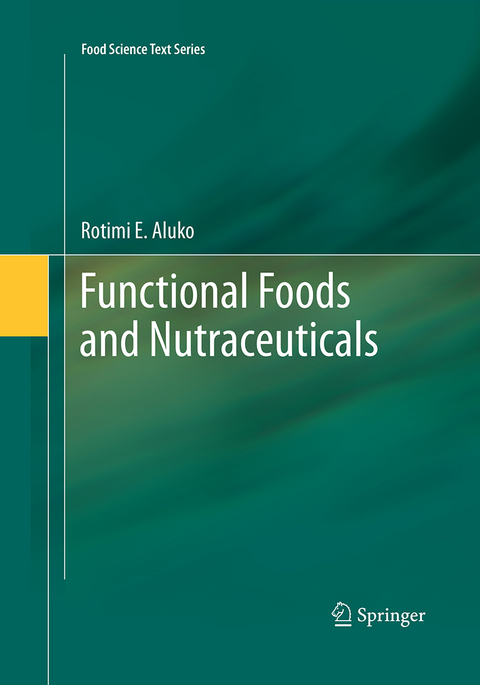
Functional Foods and Nutraceuticals
Seiten
2016
|
Softcover reprint of the original 1st ed. 2012
Springer-Verlag New York Inc.
978-1-4939-5064-5 (ISBN)
Springer-Verlag New York Inc.
978-1-4939-5064-5 (ISBN)
This book allows readers to be specific when they say 'you are what you eat'. Logically structured to facilitate study, it provides in-depth examinations of the chemical and nutritional aspects of ingredients and functional foods such as soybean, tea, and fish.
"Functional food or medicinal food is any fresh or processed food claimed to have a health-promoting and/or disease-preventing property beyond the basic nutritional function of supplying nutrients, although there is no consensus on an exact definition of the term.
This is an emerging field in food science, in which such foods are usually accompanied by health claims for marketing purposes, such as a company's ‘cereal is a significant source of fiber. Studies have shown that an increased amount of fiber in one's diet can decrease the risk of certain types of cancer in individuals.’
Functional foods are sometimes called nutraceuticals, a portmanteau of nutrition and pharmaceutical, and can include food that has been genetically modified. The general category includes processed food made from functional food ingredients, or fortified with health-promoting additives, like "vitamin-enriched" products, and also fresh foods (e.g., vegetables) that have specific claims attached. Fermented foods with live cultures are often also considered to be functional foods with probiotic benefits."
"Functional food or medicinal food is any fresh or processed food claimed to have a health-promoting and/or disease-preventing property beyond the basic nutritional function of supplying nutrients, although there is no consensus on an exact definition of the term.
This is an emerging field in food science, in which such foods are usually accompanied by health claims for marketing purposes, such as a company's ‘cereal is a significant source of fiber. Studies have shown that an increased amount of fiber in one's diet can decrease the risk of certain types of cancer in individuals.’
Functional foods are sometimes called nutraceuticals, a portmanteau of nutrition and pharmaceutical, and can include food that has been genetically modified. The general category includes processed food made from functional food ingredients, or fortified with health-promoting additives, like "vitamin-enriched" products, and also fresh foods (e.g., vegetables) that have specific claims attached. Fermented foods with live cultures are often also considered to be functional foods with probiotic benefits."
Dr. Rotimi Aluko has earned a PhD in Food Chemistry from the University of Guelph, Ontario, Canada and is currently a Professor of Human Nutritional Sciences at the University of Manitoba, Winnipeg, Canada. He has continued to maintain an active research program on functional foods with an emphasis on food protein-derived bioactive peptides.
Part I: Nutrient Components of Food.- 1. Bioactive Carbohydrates.- 2. Bioactive Lipids.- 3. Bioactive Proteins.- 4. Bioactive Polyphenols and Carotenoids.- Part II: Specific Functional Foods.- 5. Soybean.- 6. Fruits and vegetables.- 7. Milk and Milk Products.- 8. Fish.- 9. Miscellaneous Foods and Food Components.
| Erscheinungsdatum | 17.11.2016 |
|---|---|
| Reihe/Serie | Food Science Texts Series |
| Zusatzinfo | XII, 155 p. |
| Verlagsort | New York |
| Sprache | englisch |
| Maße | 178 x 254 mm |
| Themenwelt | Medizin / Pharmazie ► Gesundheitsfachberufe ► Diätassistenz / Ernährungsberatung |
| Naturwissenschaften ► Biologie ► Biochemie | |
| Naturwissenschaften ► Chemie | |
| Technik ► Lebensmitteltechnologie | |
| ISBN-10 | 1-4939-5064-9 / 1493950649 |
| ISBN-13 | 978-1-4939-5064-5 / 9781493950645 |
| Zustand | Neuware |
| Informationen gemäß Produktsicherheitsverordnung (GPSR) | |
| Haben Sie eine Frage zum Produkt? |
Mehr entdecken
aus dem Bereich
aus dem Bereich
Indikation, Diagnostik, Therapie
Buch (2024)
Thieme (Verlag)
CHF 109,95
Unter Mitarbeit von Walter Burghardt
Buch | Softcover (2020)
Urban & Fischer in Elsevier (Verlag)
CHF 78,40


